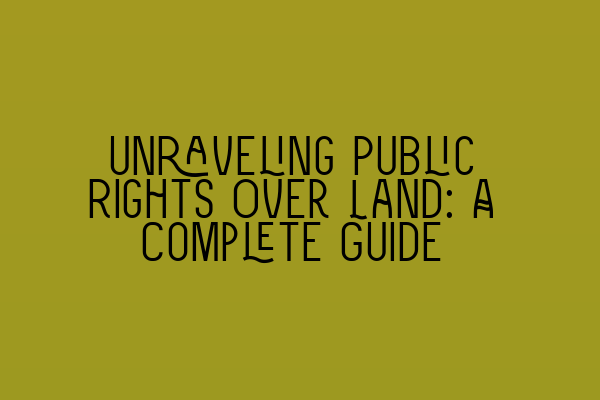Unraveling Public Rights Over Land: A Complete Guide
As a property owner or a legal professional dealing with property law, it is essential to have a comprehensive understanding of public rights over land. These rights can have a significant impact on property ownership and usage, and it is crucial to unravel the complexities surrounding them. In this complete guide, we will delve into the depths of public rights over land and provide you with valuable insights to navigate this complex legal territory.
Understanding Public Rights Over Land
Public rights over land are legal entitlements granted to members of the public to access, use, or enjoy certain areas of land that are not privately owned. These rights can include access rights, such as rights of way, rights to use common land, or even rights to fish on certain water bodies. Public rights over land are typically established through legislation or historical use and can vary depending on the country or region.
Types of Public Rights Over Land
There are several types of public rights over land that you should be aware of:
1. Rights of Way: These are rights granted to the public to pass over a particular piece of land, usually in the form of footpaths, bridleways, or carriageways. Rights of way can be public or private, and their existence can be established through established paths, usage, or legal documentation.
2. Common Land: Common land refers to areas of land that are owned by individuals collectively and are available for use by the public. These areas often have specific purposes, such as grazing livestock or recreational activities. Access to common land is usually governed by specific regulations and can vary depending on local bylaws.
3. Rights to Light: Rights to light protect a property owner’s right to receive natural light through their windows. These rights prevent neighboring properties or surrounding developments from obstructing the availability of natural light. They are typically protected through legal easements or planning regulations.
4. Riparian Rights: Riparian rights are the rights of a landowner whose property borders a river, stream, or water body. These rights can include the right to access and use the water, fishing rights, or the right to build structures on the watercourse. Riparian rights can be subject to regulations and restrictions imposed by environmental agencies and relevant authorities.
5. Mineral Rights: Mineral rights grant owners the exclusive rights to extract minerals, such as coal, oil, or gas, from the land they are associated with. These rights are often separate from ownership of the land itself and can be subject to specific licensing and regulatory requirements.
Establishing and Protecting Public Rights Over Land
The establishment and protection of public rights over land involve a combination of legislation, legal documents, and historical usage. For example, rights of way can be established through ancient paths that have been used by the public for a long time or through specific legal agreements, such as public footpath orders. Common land, on the other hand, may have boundaries and regulations set out in historical documents or determined by local authorities.
To protect public rights over land, it is crucial to understand the applicable laws and regulations governing these rights. For example, if you are a landowner and are informed of a proposed development that may infringe on your riparian rights, you may need to take legal action to protect your rights and seek appropriate compensation. Seeking professional legal advice in such situations is highly recommended to ensure your rights are safeguarded.
Navigating Public Rights Over Land: The Role of a Property Solicitor
As public rights over land can be complex and subject to various legal considerations, it is often advisable to engage the services of a property solicitor who specializes in property and land law. A property solicitor with expertise in this area can guide you through the intricacies of public rights over land, help establish and protect your rights, and represent your interests in any disputes or legal proceedings.
At SQE Property Law & Land Law, we have a team of experienced property solicitors who are well-versed in public rights over land. Our solicitors can provide you with tailored legal advice and representation to ensure you understand your rights, obligations, and options when it comes to dealing with public rights over land.
Conclusion
Public rights over land play a significant role in property ownership and usage. Understanding the various types of public rights over land, how they are established, and how to protect them is essential for property owners and legal professionals alike. By unraveling the complexities surrounding public rights over land and seeking professional legal advice when needed, you can navigate this legal terrain with confidence.
For further resources and information on SQE exams, preparation courses, and upcoming exam dates, please check out these related articles:
– SQE 1 Practice Exam Questions
– SQE 1 Practice Mocks FLK1 FLK2
– SQE 2 Preparation Courses
– SQE 1 Preparation Courses
– SRA SQE Exam Dates
Remember, when it comes to matters of public rights over land, seeking professional guidance can make all the difference in ensuring your rights are protected and upheld. Contact SQE Property Law & Land Law today for expert legal assistance in this complex area of property law.
